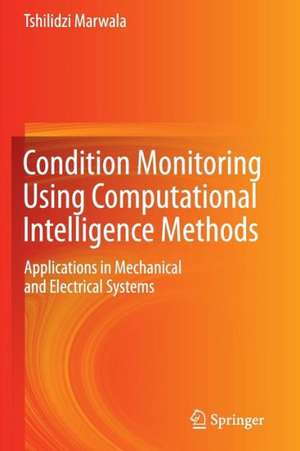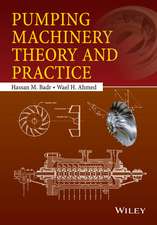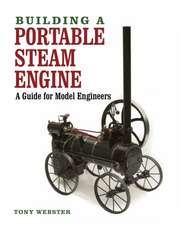Condition Monitoring Using Computational Intelligence Methods: Applications in Mechanical and Electrical Systems
Autor Tshilidzi Marwalaen Limba Engleză Paperback – 22 feb 2014
•
fuzzy systems; rough and neuro-rough sets; neural and Bayesian networks;hidden Markov and Gaussian mixture models; and support vector machines.
| Toate formatele și edițiile | Preț | Express |
|---|---|---|
| Paperback (1) | 638.43 lei 6-8 săpt. | |
| SPRINGER LONDON – 22 feb 2014 | 638.43 lei 6-8 săpt. | |
| Hardback (1) | 642.51 lei 6-8 săpt. | |
| SPRINGER LONDON – 23 ian 2012 | 642.51 lei 6-8 săpt. |
Preț: 638.43 lei
Preț vechi: 751.10 lei
-15% Nou
Puncte Express: 958
Preț estimativ în valută:
122.18€ • 126.22$ • 101.68£
122.18€ • 126.22$ • 101.68£
Carte tipărită la comandă
Livrare economică 25 martie-08 aprilie
Preluare comenzi: 021 569.72.76
Specificații
ISBN-13: 9781447161349
ISBN-10: 1447161343
Pagini: 252
Ilustrații: XVI, 236 p.
Dimensiuni: 155 x 235 x 13 mm
Greutate: 0.36 kg
Ediția:2012
Editura: SPRINGER LONDON
Colecția Springer
Locul publicării:London, United Kingdom
ISBN-10: 1447161343
Pagini: 252
Ilustrații: XVI, 236 p.
Dimensiuni: 155 x 235 x 13 mm
Greutate: 0.36 kg
Ediția:2012
Editura: SPRINGER LONDON
Colecția Springer
Locul publicării:London, United Kingdom
Public țintă
ResearchCuprins
Introduction to Condition Monitoring.- Data Gathering Methods.- Preprocessing and Feature Selection.- Condition Monitoring Using Neural Networks.- Condition Monitoring Using Support Vector Machines.- Condition Monitoring Using Neuro-fuzzy Methods.- Condition Monitoring Using Neuro-rough Methods.- Condition Monitoring Using Hidden Markov Models and Gaussian Mixture Models.- Condition Monitoring Using Hybrid Techniques.- Condition Monitoring Using Incremental Learning with Genetic Algorithms.- Conclusion.
Notă biografică
Tshilidzi Marwala is the Executive Dean of the Faculty of Engineering and the Built Environment at the University of Johannesburg. He was previously a full Professor of Electrical Engineering as well as the Carl and Emily Fuchs Chair of Systems and Control Engineering at the University of the Witwatersrand. He is a Fellow of the Royal Society of Arts as well as the Royal Statistical Society and a Senior Member of both the IEEE and the ACM. He holds a PhD in Engineering from the University of Cambridge and a PLD from Harvard University in the USA. He was a post-doctoral research associate at Imperial College (London) working in the general area of computational intelligence. He was a visiting fellow at Harvard University and Cambridge University. His research interests include the application of computational intelligence to mechanical. civil, aerospace and biomedical engineering.
Professor Marwala has made fundamental contributions to engineering including the development of the concept of pseudo-modal energies and the development of the Bayesian framework for solving engineering problems such as finite-element-model updating. He has supervised 40 masters and PhD students many of whom have proceeded to distinguish themselves at universities such as Harvard, Oxford and Cambridge. He has published over 200 papers in archival journals, proceedings and book chapters and holds 3 patents. He has published three books: Computational Intelligence for Modelling Complex Systems published by Research India Publications, Computational Intelligence for Missing Data Imputation, Estimation, and Management: Knowledge Optimization Techniques published by the IGI Global Publications (New York) and Finite Element Model Updating Using Computational Intelligence published by Springer (2010); he has a fourth, Conflict Modeling Using Computational Intelligence under contract with Springer’s computer science list. He is the Associate Editor of 4 journals including theInternational Journal of Systems Science and his work has appeared in prestigious publications such as New Scientist.
Professor Marwala has made fundamental contributions to engineering including the development of the concept of pseudo-modal energies and the development of the Bayesian framework for solving engineering problems such as finite-element-model updating. He has supervised 40 masters and PhD students many of whom have proceeded to distinguish themselves at universities such as Harvard, Oxford and Cambridge. He has published over 200 papers in archival journals, proceedings and book chapters and holds 3 patents. He has published three books: Computational Intelligence for Modelling Complex Systems published by Research India Publications, Computational Intelligence for Missing Data Imputation, Estimation, and Management: Knowledge Optimization Techniques published by the IGI Global Publications (New York) and Finite Element Model Updating Using Computational Intelligence published by Springer (2010); he has a fourth, Conflict Modeling Using Computational Intelligence under contract with Springer’s computer science list. He is the Associate Editor of 4 journals including theInternational Journal of Systems Science and his work has appeared in prestigious publications such as New Scientist.
Textul de pe ultima copertă
Condition monitoring uses the observed operating characteristics of a machine or structure to diagnose trends in the signal being monitored and to predict the need for maintenance before a breakdown occurs. This reduces the risk, inherent in a fixed maintenance schedule, of performing maintenance needlessly early or of having a machine fail before maintenance is due either of which can be expensive with the latter also posing a risk of serious accident especially in systems like aeroengines in which a catastrophic failure would put lives at risk. The technique also measures responses from the whole of the system under observation so it can detect the effects of faults which might be hidden deep within a system, hidden from traditional methods of inspection.
Condition Monitoring Using Computational Intelligence Methods promotes the various approaches gathered under the umbrella of computational intelligence to show how condition monitoring can be used to avoid equipment failures and lengthen its useful life, minimize downtime and reduce maintenance costs. The text introduces various signal-processing and pre-processing techniques, wavelets and principal component analysis, for example, together with their uses in condition monitoring and details the development of effective feature extraction techniques classified into frequency-, time-frequency- and time-domain analysis. Data generated by these techniques can then be used for condition classification employing tools such as:
· fuzzy systems;
· rough and neuro-rough sets;
· neural and Bayesian networks; · hidden Markov and Gaussian mixture models; and
· support vector machines.
On-line learning methods such as Learn++ and ILUGA (incremental learning using genetic algorithms) are used to enable the classifiers to take on additional information and adjust to new condition classes by evolution rather than by complete retraining. Both the chosen methods have good incremental learning abilities with ILUGA, in particular, not suffering from catastrophic forgetting.
Researchers studying computational intelligence and its applications will find Condition Monitoring Using Computational Intelligence Methods to be an excellent source of examples. Graduate students studying condition monitoring and diagnosis will find this alternative approach to the problem of interest and practitioners involved in fault diagnosis will be able to use these methods for the benefit of their machines and of their companies.
Condition Monitoring Using Computational Intelligence Methods promotes the various approaches gathered under the umbrella of computational intelligence to show how condition monitoring can be used to avoid equipment failures and lengthen its useful life, minimize downtime and reduce maintenance costs. The text introduces various signal-processing and pre-processing techniques, wavelets and principal component analysis, for example, together with their uses in condition monitoring and details the development of effective feature extraction techniques classified into frequency-, time-frequency- and time-domain analysis. Data generated by these techniques can then be used for condition classification employing tools such as:
· fuzzy systems;
· rough and neuro-rough sets;
· neural and Bayesian networks; · hidden Markov and Gaussian mixture models; and
· support vector machines.
On-line learning methods such as Learn++ and ILUGA (incremental learning using genetic algorithms) are used to enable the classifiers to take on additional information and adjust to new condition classes by evolution rather than by complete retraining. Both the chosen methods have good incremental learning abilities with ILUGA, in particular, not suffering from catastrophic forgetting.
Researchers studying computational intelligence and its applications will find Condition Monitoring Using Computational Intelligence Methods to be an excellent source of examples. Graduate students studying condition monitoring and diagnosis will find this alternative approach to the problem of interest and practitioners involved in fault diagnosis will be able to use these methods for the benefit of their machines and of their companies.
Caracteristici
Helps the practitioner prevent machine failure, improving safety and cutting costs Shows the reader how computational intelligence can provide an efficacious alternative to traditional visual inspection techniques Uses on-line learning methods to avoid the need for time-consuming systems retraining











